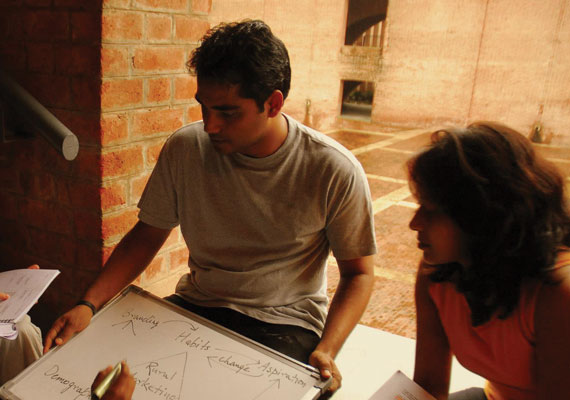
Don't Rush!
Good preparation is essential to a successful job interview. Here's our guide to the basics you'll need to cover to plan and practise your performance. When you've been invited for an interview, your thoughts naturally turn to giving a winning performance on the day. A bit like exams, interviews can creep up on you, but good preperation is the key to success.
Don't rush through your interview - take time with your answers to think about what you're saying.
Do your Homework
One of the biggest complaints of hiring managers is that many job interview candidates know very little about the company they're interviewing for. Google the company you are interviewing with and read some of the articles that pop up; study the company's website; know the company's mission, its products and services, its locations, and who their top executives are. Go to the Public Relations tab on their website and print out some of their latest press releases. Study them so that you can talk in the interview about what's going on with the company now
Prepare a list of likely questions. Getting a list of common questions for an interview is easier than ever before. You can never underestimate the importance of preparation. It’s the first step and the most important. Identify what the organization wants and needs. While the focus of "Why should we hire you?" is on ‘YOU,’ the interviewee, it’s important to remember that the answer isn’t all about you! Google yourself. Find out what the company knows about you. See what they see. If there’s anything negative about you, have a response ready as to why it’s negative but don’t get too defensive. Respond and then move on


Interview Yourself for the Position
Before every interview, ask yourself: “Why am I a good fit for this job?” “I tell my clients to post the question, ‘Why should we hire you?’ on their bathroom mirror, refrigerator or anyplace they will see it during the day,” Salpeter says. “I instruct them to answer, out loud, keeping different companies in mind each time. Rehearsing this way will help you hone in on what you have to offer .
Identify what is unique or special about you. How have you gone above and beyond the call of duty? What did you accomplish that no one else managed to do? Did you volunteer to tackle a problem and solve it? “Don’t underestimate the value of looking at yourself, your skills and your accomplishments and outlining the key points you will want to share with a prospective employer.
Practice and Plan
Role play answering typical interview questions with a friend, colleague, or coach, says Anita Attridge, a Five O’Clock Club career and executive coach. “Be prepared for the typical interview questions by thinking about what your response would be to them before the interview,” she adds. If you are a college student, set up an appointment with your career center and have them conduct a mock interview with you. “Even if you’re a recent graduate, many college career centers will conduct mock interviews to help alumni,” Tech says. “Request that your interview is filmed so that they can critique you and you can study the film. Don’t worry if you’re nervous or you screw up. You’re much better off screwing up in a mock interview than in the real thing
You don’t necessarily want to memorize responses—but try to have a general strategy for answering common interview questions. “Today many organizations are using behavioral interview questions to better understand what you have done,” Attridge says. “They usually begin with, ‘Tell me about a time when…’” She suggests briefly describing what the situation was; how you handled the situation; and what the result was. To prepare for these, you’ll want to think about workplace experience stories that describe your accomplishments or show how you dealt with a tough situation, Khare says. “If you don’t have any stories that you can recall now, set aside a few hours to think and write down at least two or three stories. A simple question like, ‘Tell me about a time you made a mistake,’ can take you off-guard and it is not easy to recall unrehearsed. Having a repository of work experience stories written down before an interview will make it easier to recall


Reflect on Previous Interviews and Figure out your Goals
Keep a computer or paper record of your interviews. Keep a record of the time of your interviews, how long they are, your impressions of the hiring manager, and perhaps most importantly, what questions were asked of you, what answers you gave, and record any questions they asked you that you felt could have been answered differently. Study these elements and your interview skills will improve.
Most of the commonly asked questions during an interview either dig into your previous experience or want to explore your future goals, Khare says. “Prepare and articulate your goals, and remain honest here. Inconsistent answers won’t get you the respect and credibility that is a must to impress an interviewer.
Be Positive and Comfortable
When preparing for an interview and anticipating likely questions, plan to answer all questions positively. Even if one were in a bad situation, think about how you can talk about the situation positively. You always have a choice. It is much better to talk about a glass being half full then to talk about it being half empty. It’s all about your perspective, and in an interview being positive counts. Never say anything negative about your prior employers or bosses, either–no matter how bad the situation may have been. A negative answer actually is a reflection about your judgment and business acumen, and not about the employer or manager.
Preparation and practice aside, the most important tip to suggest a job seekers is to feel comfortable with the interview process. One can read all the advice in the world about acing the interview, but none of the tactics will work out unless you are not yourself during the process. Feeling comfortable and relaxed positively influences your confidence. Interviewers always appreciate a relaxed and confident candidate, as opposed to a heavy promoter and edgy one. Practice calming your nerves, and focus on how you can prove you’d be a valuable asset to the company.

